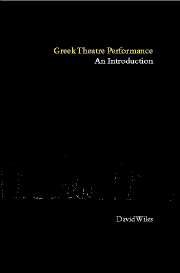8 - Reception
Published online by Cambridge University Press: 05 February 2015
Summary
REVIVING GREEK TRAGEDY
Oedipus in 1585
We can only understand what Greek theatre was like in the past by looking through the eyes of the present. Conversely, our view of the present is shaped by the past, thanks to assumptions about ‘theatre’ that we have inherited. An objective view of the ancient world is impossible. However, by seeing how different generations have reinterpreted Greek tragedy, we can gain some sort of perspective on the complex relationship of past and present. Most directors who engage with Greek drama feel (a) that they have touched on something authentically Greek which is worth bringing to the present, and (b) that there is something in the present which they would like to bring to the ancient text. The element of authenticity keeps shifting: the circular auditorium, the use of the mask, uncensored Aristophanic obscenity, the message about war. What seems authentic to one generation seems stilted, ill-researched and irrelevant to the next. I shall concentrate on three well documented productions in order to illustrate the way the past is constantly being rediscovered, and clarify some major issues facing anyone who stages a Greek play today.
The plays of Sophocles and Aeschylus, long lost to the western world, were brought from Constantinople to Venice in 1423. In 1585, in the Venetian town of Vicenza, on the Sunday before Lent, the first Greek tragedy was performed in modern translation.
- Type
- Chapter
- Information
- Greek Theatre PerformanceAn Introduction, pp. 179 - 208Publisher: Cambridge University PressPrint publication year: 2000



